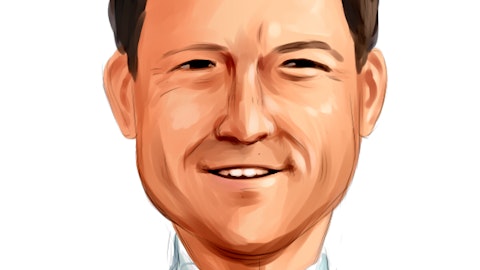Craig Bridgewater: Hi, David. It’s Craig. I guess to answer the first question in regards to the decreases in non-accrual. So, we actually had a non-accrual loan that was paid down. So, that’s kind of come off the books. So, that was a very positive development in regards to our credit loan book, during the quarter. It was a facility in the UK and a very kind of unusual circumstance, if you will, that caused it to come up. And something that we necessarily wouldn’t see — expect to reoccur, but that will settle and that was paid down. So, that’s good news. And then just going forward, in Bermuda in particular, the credit risk management team has been working really, really hard to get a good understanding of clients’ experiences, the potential impacts on loan affordability or payment affordability of loans, as the interest rates have increased over 2022.
So, we are very focused on that. And so far, we haven’t seen anything come through, no indications of any decreases in credit quality. So, no missed payments, kind of not seen anything unusual when it comes to missed payments or days past due. Usually kind of around Christmas time people do ignore the mortgage payments at least for the month as they are going to Christmas and make sure that they have — want to make sure they have a good Christmas and kind of bringing happiness to the family. But that’s kind of seasonal and that’s — we don’t see that as being unusual.
Michael Collins: And it’s a different market in the sense that we — as you know, we don’t do credit scoring. We have so few mortgages and the average size of the mortgage is much higher than you would see in the U.S. So, we actually — in both Cayman and Bermuda, we actually know each property. So when someone is getting into trouble and struggling a bit, where we’ve got our arms around it, we actually know how to restructure it. We know what it will sell for. So, it is really underwriting mortgage-by-mortgage. So, it’s a very different market. So, it’s such small — there is such small places that I think we get intelligence very early when certain borrowers are struggling, but we are just not seeing at this point, irrespective of Christmas, which is very important in the islands.
David Feaster: That’s right. That’s helpful. Thank you. And then, maybe just touching on the acquisition. Just curious, it sounds like we might be getting some revenues here in the first quarter. Just kind of curious how due diligence has been going? I know it’s a time consuming process. Whether you are seeing more clients that meet your thresholds than you’d initially expected? And then just, if you could provide us any financial impacts from the deal or is it still just too early to tell?
Michael Schrum: Hi, David. It’s Michael Schrum. So yes, teams are working very diligently on pushing both the consents through the systems of any client consent in order to actually do the due diligence, and that’s going pretty well, a little bit slower, a lot of questions from clients around, hey, what’s this all, and so needing to explain what’s happening. But it’s a good conversation. Once we stop the DD process, we have sort of a checklist for fiduciary and for obviously any flags that we see on the file. We also check for missing documents. And so far what we have seen, we started really with Singapore and Bahamas. It has been very high quality of client files. It’s also a slightly younger book than the Guernsey book. And we’re very pleased that we are going to be closing the first tranche of clients at the end of the first quarter here.





